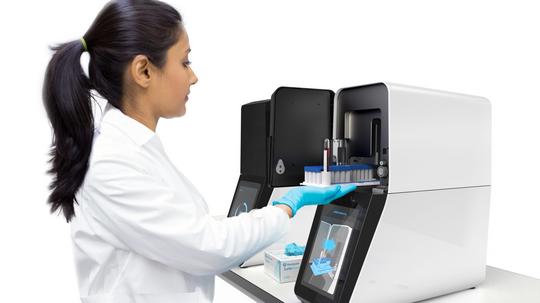
Bloodstream infections are a global problem. Changing antimicrobial resistance rates, pathogen distribution, demographics and medical care delivery are all responsible for how they affect patients, but no matter how you slice it, the numbers are stark: As many as 250,000 such infections occur each year in the U.S., with a mortality rate of 35 percent and costs of up to $37,000 per case.
What's more, identifying the pathogens responsible is one of the most difficult problems in infectious disease diagnostics, according to Alon Singer, who earned his Ph.D. in biomedical engineering from Boston University in 2012.
"Time and time again, the feedback I got from leaders in the space was that direct identification of microorganisms was something that couldn't be done at all," Singer told BostInno.
It was that problem that led Singer to found HelixBind in 2013, one year after he completed his Ph.D. The startup is behind a rapid diagnostic test, one that identifies microorganisms directly from a patient's blood.
Singer thinks that if deployed in patients early, HelixBind's test has the potential to prevent bloodstream infections from turning into sepsis, which kills nearly 270,000 adults in the U.S. each year.
"What we’re doing is developing an innovative diagnostic platform to revolutionize care for invasive infections such as those that cause sepsis," Singer said. "Our test can identify infections directly from blood and turns around in three hours."
HelixBind's test works by detecting DNA from microbes in a patient's blood. It uses duplex DNA-invading modified peptide nucleic acids (PNAs) to identify bacterial and fungal pathogens, rapidly and without culturing. And because the test is culture-free, it is not inhibited by any antimicrobial treatments the patient may have had.
The startup's team completed an early clinical assessment on 61 patients and published the results in mBio, an open-access journal published by the American Society for Microbiology, in 2016. The team originally planned to launch additional studies this year in preparation for formal clinical trials, but Covid-19 delayed those plans. HelixBind is now hoping to begin studies in the fall.

HelixBind is privately funded. The money comes from an array of organizations, including CARB-X, the National Institutes of Health and the National Science Foundation, along with several individuals: "ex-executives, C-suite people from various diagnostic and medical device companies," Singer said.
Now, HelixBind is growing. The 27-person team recently moved from an office in Marlborough to Boxborough, where the startup will have more room to breathe—and to hire. HelixBind is actively recruiting for its engineering, manufacturing and quality assurance teams.
HelixBind received $3 million from the National Institutes of Health this month to assess whether its rapid test can be used to detect the bacterium that causes Lyme Disease. The startup has clinical studies planned for the 2021 tick season and is looking to sign up additional clinical partners.








